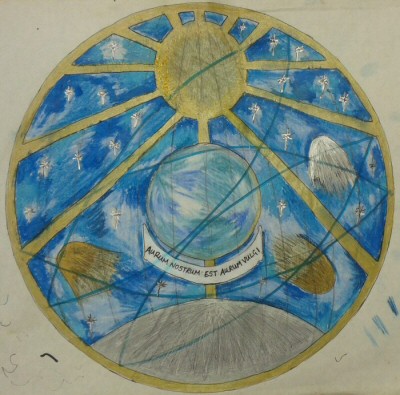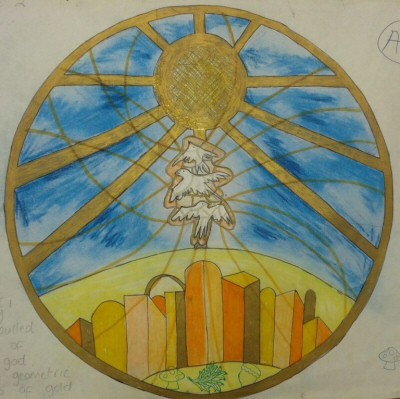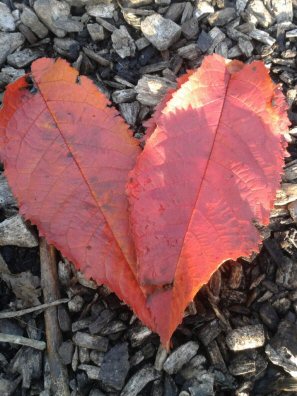Everybody has a lot to say about everybody else but before we project out lets begin with what we have got...ourselves.. project inwards and become your own best friend...It starts here...from your Heart. The physical and the ethereal transmuted, where we turn our shit into fertile compost and bring all together in Union, to become happy in our own skin, in order to become the most effective realisation of ourselves and most effective in our own sphere of influence.
Take your time ....Breathe...and let me take you on a journey that spans the ages and the continents, there exists fragmented knowledge - generational desire paths of inquiry into the nature of mind, body and spirit. Of the environment around us, its cycles and patterns -the study of the very fabric of reality itself.

'Aurum Nostrum est Aurum Vulgi' -Our Gold is not common Gold
So what else have we got ?...we have traditions of ancient apothecary such as traditional Chinese medicine, Aurvedic medicine from India and the traditions of the Native American people. Humans have discovered many ancient manuscripts not discussed in the mainstream, some impart wisdom and knowledge, some challenge known history and call timelines into question. Some are in unknown languages, we have found for example Egyptian scrolls in America and the work of Iccac Newton in a Middle Easten Library. Once our inquires were holistic in all ways, now things have become so separated that they are often at odds with each other, we see this in areas such as science, religion, politics and the economy. We find it within ourselves, our communities and the world at large. Yet historically we see documented the journeys of ancient people to distant shores way before the officially recognised founding of continents. We also have a linage of divergent thinkers, who followed these desire paths, those who challenged the status quo and dedicated their lives to health, healing and scientific enquiry.
One notable philosopher, Leucippus born around 460BC, was one of the first philosophers to propose the existence of atoms, as indivisible units of matter. If we look back to ancient Greece and Egypt we come across the legends of Thoth called Hemes by the Greeks and also Hermes Trismegistus, he is the purported author of both the Emerald Tablet and the Corpus Hermeticum, and one of those archetypes in history where the lines between mythical and actual become blurred. Hermes Trismegistus represents a combination of the Thoth and Hermes, who were both gods of writing, science and magic in their respective cultures .The surviving writings of Hermeticism are known as the Corpus Hermetica.These letters were lost to the western world after classical times, but survived in the Byzantine libraries. In the Fifteenth century, the letters were rediscovered and translated into Latin by the court of Cosimo de Medici . It is here we see the beginnings of Alcemey, philosophy and the sciences while still connected to the spirit, this Alchemical practise - often called the hidden knowledge has been woven through other great works such as the doctrine of signatures, it has been utilised through the centuries by divergent individuals such as Issac Newton and Carl Jung.
The Physicians of Myddfai were a succession of herbal physicians who lived in the village of Myddfai in Carmarthenshire, Wales. The first record of them is from the 13th century. Their book acknowledging Greek, Roman and Arab medical literature shows the breadth of culture in Wales at this time. Interestingly they also wrote about self care and patient care. They in fact include a long list of advice for the care of the self and in their book we are told regarding a physician “he should be a kind man, gentle, meek, intelligent, wise and gentlemanly in act and deed, in word and conduct, being careful not to shame those whom he has to examine, particularly when he has to examine women.”
Paracelsus 1493 - 1541 (real name Theophrastus von Hohenheim), was a Swiss physician, alchemist, and astrologer. He was a pioneer in the medical revolution of the German Renaissance, placing importance on the value of observation in combination with received wisdom and he is credited as the father of toxicology. Paracelsus was one of the first medical professors to recognize that physicians required a solid academic knowledge in the natural sciences, especially chemistry, he pioneered the use of chemicals and minerals in medicine. His hermetical beliefs were that sickness and health in the body relied upon the harmony of humans (microcosm) and nature (macrocosm). He took a different approach from those before him, using this analogy not in the manner of soul-purification but in the manner that humans must have certain balances of minerals in their bodies,and that certain illnesses of the body had chemical remedies that could cure them. He pioneered the formulation and application of medicinal preparations from minerals and chemicals. This shift – combined with his outspoken anti-authoritarianism – brought him into conflict with the official academic medical establishment, he also wrote in German – not the preferred Latin and his emphasis on practical experience, experiment, and folk medicine resulted in further alienation. He is also credited with bringing Opium to the west, a substance which has been used for many centuries and has a very interesting history from ancient beginnings to its compounds being isolated by western physicians, various opiate derivatives were developed from here. Which today forms a large group of controversial and highly used pharmaceutical medicines. With opium we can see what happens when a plant is taken control of by big phama. If you would like to read more on this interesting topic please see here
Nicholas Culpeper 1616 – 1654 was a renowned herbalist, was a man known for his vices as much as for his virtues. He was an audacious character who held a strong dislike for the establishment and authority In the 16th century, the medical world had reached a crisis point. In London, medical practice was unregulated meaning here were more and more ‘quack’ doctors and false remedies. In 1518, Henry VIII stepped in, issuing a charter which took away the Church's power to regulate medicine and handed it over to The Royal College of Physicians. The College exercised full control over the apothecaries setting standards and issuing licenses required to practice medicine legally. On 26 April 1618, in a further effort to standardise medical practice, a royal proclamation was circulated ordering all apothecaries to obtain a copy of Pharmacopoeia Londinensis. Culpepers own herbal which he distributed freely is still available to this day and can be downloaded as a free pdf from many online sources.
Carl Jung 1875 – 1961 was also influenced by alchemy, his book Mysterium Coniunctionis represents his summing up of his long preoccupation with alchemy. Jung envisions a great psycho-physical mystery to which the alchemists of old gave the name of unus mundus -one world. At the root of all being, so he says, there is a state wherein physicality and spirituality meet in a transgressive union. Synchronistic phenomena, and other as yet unexplained mysteries of physical and psychological origin, appear to proceed from this holistic state. It is possible that this mysterious condition is the true home of the archetypes, which project themselves into the realm of the psyche.
Whilst there are many females of note in science and herbalism they are few and far between in terms of alchemical connection in recorded history. We do however in ancient texts find mention of Cleopatra the Alchemist who likely lived during the 3rd or 4th century, she was a Greek/ Egyptian alchemist, author, and philosopher. She experimented with practical alchemy and her use of imagery reflects on conception and birth, the renewal and transformation of life telling us the philosopher alchemist who contemplates their work is comparable to a loving mother who thinks about her child and feeds it. We also find Mary the Jewess or Miriam the Prophetess, in Hebrew Miriam HaYehudia. The Roman’s called her Maria Hebrea, Ibn al-Nadim called her, Mary the Daughter of Plato. As far as we can tell she lived at some point between the 3rd-century B.C.E and 3rd-century c.e. She is attributed with inventing hermetic sealing, the Alembic three-armed still, and finding hydrochloric acid. Mary's name survives in her invention of the bain-marie (Mary's Bath), I think it is quite possible that there was more than one Mary and that both women's names may have been used as pseudonyms. Use of pseudonym may have protected a ladies identity or maybe it was used to infer that the works were inspired by, or might actually have been, the work of an older alchemist.

The there is so much more to say of the stories, theories, works and beliefs of those I have written about here and indeed they are but a handful, there are also many others from all over the world who have come before for whom through scientific/spirital inquiry and critical thinking share this common thread of Hermetic teaching. The Hermetic Laws shared in the Corpus Hermetic have held immense value for these ancient cultures. Whenever they resurface in culture, they act as a catalyst to creative renaissance, revolutions, and cultural regeneration. There are 7 Laws which are some of the oldest and most influential systems of thinking, which have the potential to expand horizons, broaden possibilities, and possibly assist the curious in the pursuit of fuller, happier, more meaningful and longer life — as much today as they ever have, they are as follows:
MENTALISM- All is mind, the universe is mental, creation is born of the mind
CORRESPONDANCE- As above, so below
VIBRATION- Nothing rests, everything is constantly moving right down to the smallest atoms
POLARITY- Everything is duel, different point on the same scale eg. hot and cold are the same thing at varying degrees
GENDER- Both genders are in everything, it manifests on all planes
RYTHUM - Everything flows, out and in, like the tides, All things rise and fall
CAUSE AND EFFECT - Every cause has its effect, Every effect has its cause, Everything happens according to law ’Chance is but a name for law not recognized’ There are many planes of causation, but nothing escapes the law.
In practical terms alchemists delt with plants, metals and ores and how things changed depending on the processes applied alchemists over time have recorded vast numbers of these, for example two intrinsic transformations are -
FERMENTATION - A metabolic processes, chemical changes in organic substancesthrough the action of enzymes eg. death of a grain birth of a spirit OR a refinement of the self
DISTILATION- Separating the components/substances from a liquid mixture by selective boiling and condensing OR Inner peace among the mundane, Enlightenment
In essence the work of the alchemist is concerned with the discovery of the 'Prima Materia' described as the first matter, primal material. Expressed either as a physical thing or as a phycological symbol of core realisation. The definition of pure is of course debatable and we live in a realm permeated with toxicity. I would put forward my own definitions as:
1. A singular substance free of impurities
2. something having been fermented and distilled
3. Matter before thought
4. pure and natural are not necessarily mutually exclusive
Here at The Ancient Apothocary we invite you to stand in your own power to (di)solve and coagulate, to breakdown and bring back together in pure form....both within and without ...ALL in Union, as opposed to us as a species repeating the same patterns and expecting a different outcome we just might find here lies the key to our evolution... We think its way overdue, dont you? So as we come to the end of this particular journey ask yourself, do we really want to irradicate the magic because we think we can explain the mechanics? In any case Clarkes third law states; Any sufficiently advanced technology is indistinguishable from magic. Should we homogenize and corporatize our health, well being and indeed our lives, Or rather should we recognise the creative force inside each and every one of us and share our knowledge and skills freely for the advancement of ALL. We at Ancient Apothocary choose to focus on verbs rather than nouns, we listen to the spark from within and the wisdom whispered on the winds of the ages, as Newton once said we stand on the shoulders of giants.
Enter the Portal to join HERE.....


